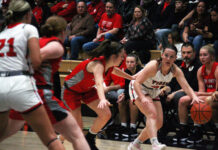It’s been a little more than three years since Andrew Luck shocked the wide, wide world of sports when he retired as a 29-year-old star seemingly at the top of his game two weeks before the season was to begin.
What is clear is that the Indianapolis Colts have been plunged into quarterback purgatory, cycling through a series of retreads (Philip Rivers, Matt Ryan now Nick Foles) along with flailing upstarts (Jacoby Brissett, Carson Wentz and Sam Ehlinger) in what should have been the middle of a three-decade period of excellence that began in 1998 with Peyton Manning.
Luck resurfaced this past month in an ESPN interview with Seth Wickersham and acknowledged the predicament he created for the Colts. In 2012, the team cut Manning, who would go on to play in two more Super Bowls with the Denver Broncos, for what appeared to be limitless potential with Luck, who they drafted No. 1 that year.
“I regret the timing of when I retired,” Luck said. In retrospect, Wickersham writes, Luck recently admitted to students at a Q&A event that he wished he would’ve told the Colts immediately following the 2018 season that he intended to hang up the cleats in his prime. Luck had thrown 39 TDs in 2018 and was named the NFL’s Comeback Player of the Year.
Which, deep down, that had been the Luck family’s M.O. At his Ubben Lecture at DePauw University in April 2015, Luck said that while his former NFL quarterback father never forced the game on him, “The only rule in our family was if you started a season in whatever sport, you had to finish that season. There was no quitting halfway, which I’m thankful for.”
But it was more complicated than that. “I understood myself best as a quarterback,” Luck explained to Wickersham. “I felt no understanding of other parts of myself at all. To play quarterback, you’re not allowed to worry about anything except the task at hand. And that seeps into other areas of life. It’s not the healthiest way to live.”
Nor is being a collegiate or pro quarterback in a sport that is, essentially, the American version of Roman gladiators.
For most of us, being chased by a 300-pound defensive end running at you with 4.6 speed and getting smashed to the turf would be a life-altering event. For a pro QB, it’s a way of life. And when Luck arrived in Indy, he seemed to relish that notion, often complimenting defenders for their hard hits.
I was in the Lucas Oil Stadium stands on Nov. 8, 2015, when Luck faced off against Manning in what would be the latter’s final game in Indy. Luck passed for two TDs and drove the 4-5 Colts down the field in the final minutes, setting up a 55-yard Adam Vinatieri field goal for a 27-24 upset over the undefeated Broncos. But this game took a toll, with a late hit lacerating one of Luck’s kidneys and tearing his abdominal muscle.
For most of us, peeing blood would bring about an immediate lifestyle change.
What we didn’t understand about Andrew Luck is that he was literally living out Henry David Thoreau’s classic observation: “The mass of men lead lives of quiet desperation.” Here was Luck facing a rebellion on the homefront with his wife preparing to leave. “There were some things that when I looked in the mirror, I did not like about myself. I was self-absorbed, withdrawn, in pain, and feeling pressure,” Luck told Wickersham.
He broached that topic during his DePauw lecture. “I think for leadership to be effective it has to be within your own personality,” Luck stated, adding, “you’ll be exposed as a fraud and a phony if it’s not and it won’t come off as genuine.”
So Andrew Luck listened to his body, and his wife, and abruptly left the game. His career had been on a Hall of Fame trajectory, and Colt fans were salivating over dreams of a future two or three Super Bowls and titles. The way he departed has thus plunged the team into the kind of chaos that has them at 4-9-1 with few good QB options moving forward.
He likely won’t be enshrined in the team’s “Ring of Honor,” though owner Jim Irsay let Luck keep nearly $25 million in signing bonuses. He won’t make it into the Hall of Fame at Canton.
“I think in the NFL one of the obstacles is just keeping your head on straight, keeping your eyes on the prize, in a sense,” Luck said at DePauw. “The media machine is so big and you do live in somewhat of a fishbowl that I think you could easily get astray.”
At his retirement press conference, Luck explained, “For the last four years or so, I’ve been in this cycle of injury, pain, rehab, injury, pain, rehab, and it’s been unceasing, unrelenting, both in-season and offseason, and I felt stuck in it. The only way I see out is to no longer play football. I’ve come to the proverbial fork in the road, and I made a vow to myself that if I ever did again, I’d choose me, in a sense.”
This quarterback chose his family over the game.
Brian Howey is an Indiana political commentator and managing editor of Howey Politics Indiana/State Affairs at StateAffairs.com/pro/Indiana.



